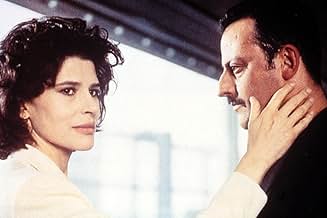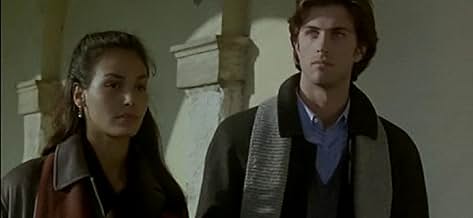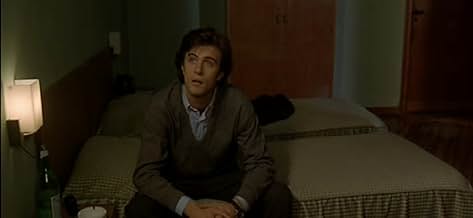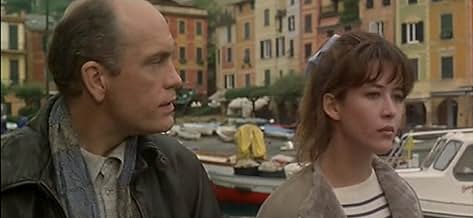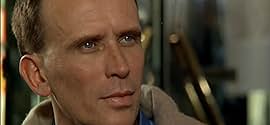IMDb रेटिंग
6.4/10
6.4 हज़ार
आपकी रेटिंग
अपनी भाषा में प्लॉट जोड़ेंFour stories about short or long relationships between men and women in Italy and France.Four stories about short or long relationships between men and women in Italy and France.Four stories about short or long relationships between men and women in Italy and France.
- पुरस्कार
- 3 जीत और कुल 6 नामांकन
Kim Rossi Stuart
- Silvano
- (as Kim Rossi-Stuart)
Inés Sastre
- Carmen
- (as Ines Sastre)
फ़ीचर्ड समीक्षाएं
A summing up of all the aging, ailing Antonioni's career themes, strengths (visual beauty, a sense of mystery and poetry) and weaknesses (pretentious stiff dialogue, ideas that are sometimes not really all that deep, a penchant for getting beautiful actresses undressed without a lot of justification).
But this is also something quite different than he's ever done, in that these are a series of short stories, loosely tied together by sequences of John Malkovich playing a director looking for his next film (Wim Wenders helped the physically limited Antonioni by directing the Malkovich sections).
By keeping the pieces smaller, I found this more fun, and more moving than most of Antonioni's films. There isn't the chance for the ideas to run as thin, and there seems to be more empathy for his characters now. Humans may be screwed up, but at least Antonioni no longer stands above them judging. One moment actually brought me near tears. The film captures the lonely enigmatic solitude of the artist, and of life itself.
But this is also something quite different than he's ever done, in that these are a series of short stories, loosely tied together by sequences of John Malkovich playing a director looking for his next film (Wim Wenders helped the physically limited Antonioni by directing the Malkovich sections).
By keeping the pieces smaller, I found this more fun, and more moving than most of Antonioni's films. There isn't the chance for the ideas to run as thin, and there seems to be more empathy for his characters now. Humans may be screwed up, but at least Antonioni no longer stands above them judging. One moment actually brought me near tears. The film captures the lonely enigmatic solitude of the artist, and of life itself.
This is a special film if you know the context. Antonioni, in his eighties, had been crippled by a stroke. Mute and half paralyzed, his friends -- who incidentally are the best the film world has -- arranged for him to 'direct' a last significant film. The idea is that he can conjure a story into being by just looking at it. So we have a film: about a director who conjures stories by simple observation. And the matter of the (four) stories is about how the visual imagination defines love.
The film emerges by giving us the tools to bring it into being through our own imagination. The result is pure movie-world: every person (except the director) is lovely in aspect or movement. Some of these women are ultralovely, and they exist in a dreamy misty world of sensual encounter. There is no nuance, no hint that anything exists but what we see; no desire is at work other than what we create.
I know of no other film that so successfully manipulates our own visual yearning to have us create the world we see. He understands something about not touching. No one understands Van Morrison visually like he does. Morrison's Celtic space music is predicated on precisely the same notion: the sensual touch that implies but doesn't physically touch.
Antonioni's redhead wife appears, appropriately as the shopkeeper and she also directs a lackluster 'making of' film that is on the DVD.
Ted's Evaluation -- 3 of 4: Worth watching.
The film emerges by giving us the tools to bring it into being through our own imagination. The result is pure movie-world: every person (except the director) is lovely in aspect or movement. Some of these women are ultralovely, and they exist in a dreamy misty world of sensual encounter. There is no nuance, no hint that anything exists but what we see; no desire is at work other than what we create.
I know of no other film that so successfully manipulates our own visual yearning to have us create the world we see. He understands something about not touching. No one understands Van Morrison visually like he does. Morrison's Celtic space music is predicated on precisely the same notion: the sensual touch that implies but doesn't physically touch.
Antonioni's redhead wife appears, appropriately as the shopkeeper and she also directs a lackluster 'making of' film that is on the DVD.
Ted's Evaluation -- 3 of 4: Worth watching.
I was stunned by this film. I have been renting Antonioni's films/rediscovering them, and this film showed me the climax and fruits of his 50 years of directing. What an eye for setting, color, and detail! I have never seen such visual beauty and poetry filmed before. I had to stop after the first story and hold back the tears. Yes, beauty moves me, like it moved Keats to write Ode on a Grecian Urn. This movie is made for the mature, emotionally and intellectually, audience. Those hoping to see physical action and soap opera will be disappointed. I will have to see this film several times before I can truly appreciate it and judge it. This film should be required viewing for all cinematographers and directors.
Possibly a truly great film, on the order of Kurosawa's Dreams.
Possibly a truly great film, on the order of Kurosawa's Dreams.
Although I'm a big fan of his work, and specially his revolutionary masterpieces, I would say this film did not live up to my expectations regarding Antonioni's abilities. In one word, I found myself utterly bored. I could not bring myself to share any emotions with the characters (no matter how hard I tried) and finally gave up on watching it. Malkovich was poorly casted and instead of bringing warmth and real human emotions to the character, made it a drag and sometimes impossible to follow. There are no real links for this four short stories, and least of all Malkovich's ramblings and philosophical (attempts at best) remarks bordering on sunday sermons. If you want good quality film, better stick to the director's earlier works. Sorry!!!
Michelangelo Antonioni is one of the major figures of cinema history, even if most people haven't heard of him. He was nowhere near as prolific as filmmakers such as Fellini, Godard, Bergman, Kurosawa, or Truffaut. And his films now are difficult to procure. There are only a few readily available, and I have seen all of those but one (Il Grido, which has recently been released on DVD by Kino). Four of the five Antonioni films that I've seen, L'Avventura, Red Desert, Blowup, and The Passenger are among the best films ever made. One other that I've seen, L'Eclisse, I think probably is also to be included among them; if only the video that I saw would not have been so horribly defiled! Now I have seen Beyond the Clouds.
I had always heard that it was a great failure, but it was difficult to lower my expectations of Antonioni. Wim Wenders' presence did not help, either. Throughout the film, there were many things that annoyed me, and also many things that I loved. I think a pros/cons list will help here.
Cons:
1. The writing seems weak. All the stories told have little depth, it seems, and we find out almost nothing about anybody we meet in the picture. Usually, Antonioni's writing can be used to show just how well a film can be written, and his characters are the definition of "complex." But in another way I can also see the style of writing presented here in a more positive light, which I'll comment on later.
2. The acting is really weak. I cannot in any way defend it. There is not one performer who isn't subpar here, and most of the actors are second-rate actors in the first place (Irene Jacob excepted). John Malkovich is one of the hammiest actors who's ever lived. The only thing I ever liked him in was Being John Malkovich, because that film delightfully (and, apparently, unnoticeably, at any rate by Malkovich himself) mocked his very pretensions, which are in full force in this film.
3. Casual nudity - okay, no one on Earth wants to see John Malkovich buck naked. Fortunately, if you are a fan of female nudity, nearly every woman in the film, including Bond girl Sophie Marceau, appears naked from head to foot with everything in between (sorry, Irene Jacob fans, no nudity from her!). I myself don't mind nudity when it is called for, like in Last Tango in Paris, but the rampant nudity in this film makes it seem like European softcore along the lines of Emmanuel. Actually, the softcore it really reminded me of was Red Shoe Diaries. The light jazz by Van Morrison just adds to this effect. Antonioni was once a proto-feminist. Many of his most famous films were from a distinctly female point of view. And when men did take over in his films, they were very unlikable. Here, the women are often exploited.
Pros:
1. Cinematography - okay, we have two of the best visual directors of all time working on this film, the cinematography ought to be outstanding. It is, generally. There are a couple of visual moments that are absolutely spectacular, some of the best I've ever seen. This includes an ethereal scene where Malkovich explores a deserted playground on a beach. He sits on a swing, spins around in it with a shot that involves a beautifully moving camera, and then we watch a strong wind blow sand around on the beach (Antonioni loves showing the wind in his films). Another great visual scene involves a camera gliding about a spiral staircase near the end of the film.
2. Mood - The nonchalant flow of the narrative actually adds a lot of mood. The title of the film is entirely appropriate. You do feel as if you're witnessing something beyond the clouds. Certain stories are left in suspension, never to be resolved, and it feels right. By the final scene, Beyond the Clouds had nearly won me over. Still, there were too many things wrong with it to suggest it to non-Antonioni fans, but Antonioni fans owe it to themselves to see it once. 6/10
I had always heard that it was a great failure, but it was difficult to lower my expectations of Antonioni. Wim Wenders' presence did not help, either. Throughout the film, there were many things that annoyed me, and also many things that I loved. I think a pros/cons list will help here.
Cons:
1. The writing seems weak. All the stories told have little depth, it seems, and we find out almost nothing about anybody we meet in the picture. Usually, Antonioni's writing can be used to show just how well a film can be written, and his characters are the definition of "complex." But in another way I can also see the style of writing presented here in a more positive light, which I'll comment on later.
2. The acting is really weak. I cannot in any way defend it. There is not one performer who isn't subpar here, and most of the actors are second-rate actors in the first place (Irene Jacob excepted). John Malkovich is one of the hammiest actors who's ever lived. The only thing I ever liked him in was Being John Malkovich, because that film delightfully (and, apparently, unnoticeably, at any rate by Malkovich himself) mocked his very pretensions, which are in full force in this film.
3. Casual nudity - okay, no one on Earth wants to see John Malkovich buck naked. Fortunately, if you are a fan of female nudity, nearly every woman in the film, including Bond girl Sophie Marceau, appears naked from head to foot with everything in between (sorry, Irene Jacob fans, no nudity from her!). I myself don't mind nudity when it is called for, like in Last Tango in Paris, but the rampant nudity in this film makes it seem like European softcore along the lines of Emmanuel. Actually, the softcore it really reminded me of was Red Shoe Diaries. The light jazz by Van Morrison just adds to this effect. Antonioni was once a proto-feminist. Many of his most famous films were from a distinctly female point of view. And when men did take over in his films, they were very unlikable. Here, the women are often exploited.
Pros:
1. Cinematography - okay, we have two of the best visual directors of all time working on this film, the cinematography ought to be outstanding. It is, generally. There are a couple of visual moments that are absolutely spectacular, some of the best I've ever seen. This includes an ethereal scene where Malkovich explores a deserted playground on a beach. He sits on a swing, spins around in it with a shot that involves a beautifully moving camera, and then we watch a strong wind blow sand around on the beach (Antonioni loves showing the wind in his films). Another great visual scene involves a camera gliding about a spiral staircase near the end of the film.
2. Mood - The nonchalant flow of the narrative actually adds a lot of mood. The title of the film is entirely appropriate. You do feel as if you're witnessing something beyond the clouds. Certain stories are left in suspension, never to be resolved, and it feels right. By the final scene, Beyond the Clouds had nearly won me over. Still, there were too many things wrong with it to suggest it to non-Antonioni fans, but Antonioni fans owe it to themselves to see it once. 6/10
क्या आपको पता है
- ट्रिवियाIn order to obtain the covering insurance needed to put the film into production, Michelangelo Antonioni (who was still recovering from a severely debilitating stroke) had to agree to have a secondary director on staff, ready to take over from him at any time. His choice, Wim Wenders, even provided the prologue and epilogue for the film.
- इसके अलावा अन्य वर्जनThere are two slightly different versions of the movie, the difference ocurring at the end. The US version of 'Beyond The Clouds' (Al di là delle nuvole, 1995) lacks the complete voice-over narration by John Malkovich's character at the end of the movie, from the moment he enters the hotel until the last image, before going to credits. The only line heard is: 'The director's profession is very peculiar...'; whereas the European cut of the movie contains a longer narration, also starting with the same line, but expanding until the last image before fading to credits. The voice-over talks about how the director's profession is to find images, only to discover another image beneath the previous one which is more faithful to the truth, and then another, and another, until you reach the one which equals reality, the one no one will ever see. Both versions are equally powerful in their own right, though it's interesting to note such a minor difference was made in the first place. Both versions are available, the US version was released in DVD, and the European version is available in VHS only.
- कनेक्शनFeatured in Fare un film è per me vivere (1995)
- साउंडट्रैकUnknown Love
Written by Lucio Dalla and Robert Sidoli
Performed by Giuseppe D'Onghia (as Beppe Donghia) (piano) and Lucio Dalla (clarin)
टॉप पसंद
रेटिंग देने के लिए साइन-इन करें और वैयक्तिकृत सुझावों के लिए वॉचलिस्ट करें
- How long is Beyond the Clouds?Alexa द्वारा संचालित
विवरण
बॉक्स ऑफ़िस
- US और कनाडा में सकल
- $31,738
- US और कनाडा में पहले सप्ताह में कुल कमाई
- $12,596
- 5 दिस॰ 1999
- दुनिया भर में सकल
- $31,738
- चलने की अवधि
- 1 घं 50 मि(110 min)
- रंग
- ध्वनि मिश्रण
- पक्ष अनुपात
- 1.66 : 1
इस पेज में योगदान दें
किसी बदलाव का सुझाव दें या अनुपलब्ध कॉन्टेंट जोड़ें

